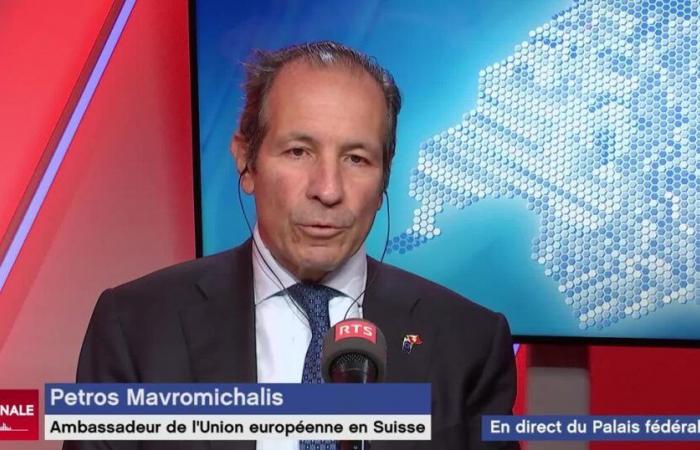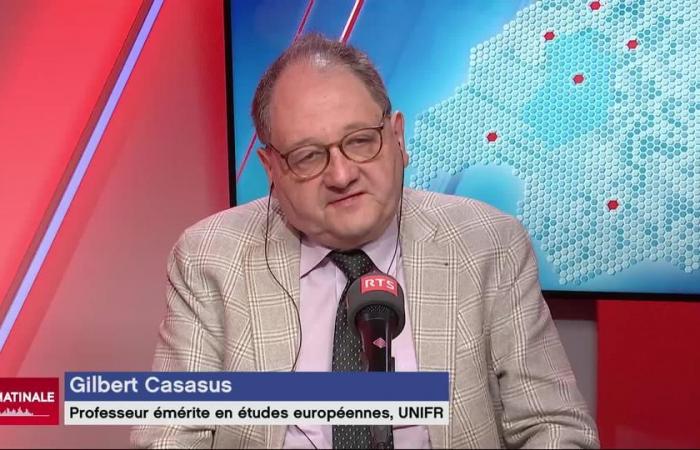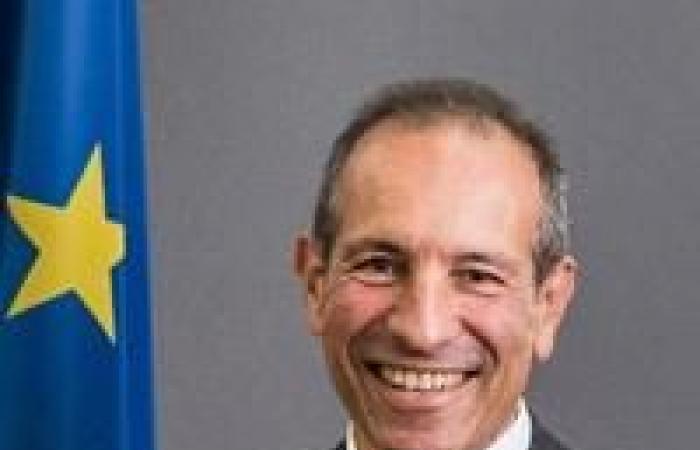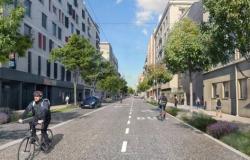As Switzerland and the European Union approach the end of their negotiations to update bilateral agreements, the ambassador of the European Union to Switzerland, Petros Mavromichalis, spoke on Wednesday in La Matinale to take stock of the state talks.
For twelve years, Switzerland and the European Union have sought to revise their bilateral agreements, signed more than a quarter of a century ago and which have become obsolete in many respects. Now, with the aim of concluding by the end of the year, negotiators try to finalize delicate pointsincluding that of the free movement of people, a subject which has recently given rise to tensions.
In 25 years of free movement, has Switzerland really experienced serious economic and social difficulties caused by citizens of the European Union? No
For Petros Mavromichalis, European Union ambassador to Switzerland, the majority of Swiss requests have already been accepted: “Everything Switzerland asked for, it has already obtained,” he believes. He is therefore surprised that the question of free movement remains a sticking point, especially since the two parties have already devoted eighteen months of negotiations to it.
>> Read also: Understanding the tumultuous relationship between Switzerland and the European Union
A red line for the European Union
The recent “cold snap” came when the European Union reaffirmed its refusal to grant Switzerland a clause allowing it to temporarily close its borders in the event of an influx of European workers. Guest of La Matinale on Wednesday, Petros Mavromichalis put this position into perspective, believing that Berne already had solutions at its disposal on this subject.
“Switzerland has already obtained a certain number of exceptions to the principle of free movement: the right to expel foreigners convicted on its territory according to its Constitution, as well as to limit access to permanent residence for those who would appeal on social assistance for long periods of time,” he explains. For him, the EU has therefore already made “many concessions” and it is now a matter of “respecting the rules” in order to be able to “participate in the Union’s internal market”.
>> Also listen again to the interview with Gilbert Casasus on how the Swiss feel about the European Union:
The diplomat also recalls that the current agreement on free movement already includes a “safeguard clause”, allowing both parties to adopt temporary measures in the event of serious economic or social difficulties. It also calls into question the urgency of the Swiss request in terms of borders. “In 25 years of free movement, has the country really experienced serious economic and social difficulties due to citizens of the European Union who come to work here? No. Our citizens come here because there are jobs and that they are qualified to occupy these jobs So they are sources of growth and prosperity for Swiss society”, he judges.
“Afterwards, I can hear the discussions about crowded trains, congested highways and the fact that it is more difficult to find housing. But that is in a way the other side of the growth coin,” he adds. he.
“No threat”
For the European Union, updating bilateral agreements does not constitute a simple formality: it is seen as essential to ensure the sustainability of stable relations with an important neighbor and trading partner. But without an institutional review, the EU warns that current agreements cannot be renewed. “We are not going to continue on this path,” underlines Petros Mavromichalis, explaining that the Union must establish solid foundations. “This means that agreements that need to be renewed, updated, will not be renewed, and that we will not conclude new agreements.”
Good relations with your neighbors should be a given

Asked whether this type of positioning was not a threat, the diplomat refutes. “No, it’s not a threat. It’s just a decision. I mean, if one type of relationship doesn’t suit you, you still don’t have to stick with it forever. There’s no of threat, it’s just our policy,” he explains.
External content
This external content cannot be displayed because it may collect personal data. To view this content you must authorize the category Services Tiers.
Accept More info
The referendum, a decisive test
If an agreement is reached by the end of December, Switzerland will then have to decide by referendum. Aware of the challenges this represents, Petros Mavromichalis is preparing for a tense campaign.
“I see that the opponents are sharpening their weapons and that we are preparing for it. So, we will not be out of the woods at the end of the year,” he admits, while emphasizing that the Swiss are the vast majority in favor of the current negotiation process, without however considering accession. For him, the EU does not have to be a dream, but Swiss citizens must understand the country’s interest in having an agreement with its European partners.
“The EU is Switzerland’s main partner. Switzerland is an exporting country and more than 50% of trade is carried out with the Union (…) good relations with its neighbor should be obvious. We are as close in terms of culture, languages, traditions, values I also think that Swiss citizens appreciate being able to travel without hindrance to neighboring countries, to be able to study abroad if they wish, to be able to do so. be able to work abroad while benefiting from the same rights as all EU citizens therefore certainly benefit the citizens of this country,” he concludes.
>> Read also: A majority of Swiss support bilaterals, according to an SSR poll
Comments collected by Pietro Bugnon
Adaptation web: Tristan Hertig








